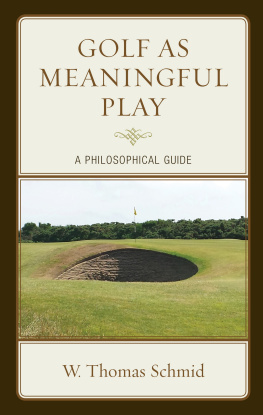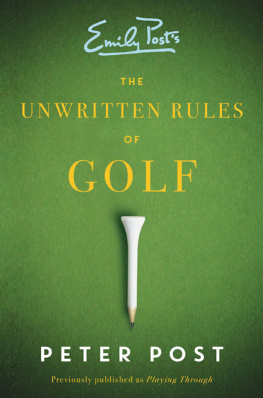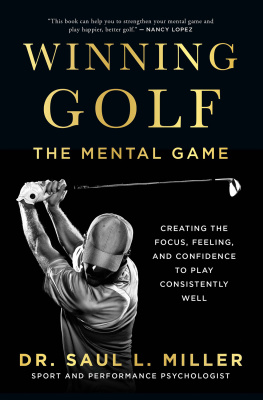Golf as Meaningful Play
Studies in Philosophy of Sport
Series editor: Shawn E. Klein, Arizona State University
The Studies in Philosophy of Sport series encourages scholars from all disciplines to inquire into the nature, importance, and qualities of sport and related activities. The series aims to encourage new voices and methods for the philosophic study of sport while also inspiring established scholars to consider new questions and approaches in this field.
The series encourages scholars new to the philosophy of sport to bring their expertise to this growing field. These new voices bring innovative methods and different questions to the standard issues in the philosophy of sport. Well-trodden topics in the literature will be reexamined with fresh takes and new questions and issues will be explored to advance the field beyond traditional positions.
Titles in Series
Defining Sport: Conceptions and Borderlines , edited by Shawn E. Klein
Golf as Meaningful Play: A Philosophical Guide , by W. Thomas Schmid
Golf as Meaningful Play
A Philosophical Guide
W. Thomas Schmid
Lexington Books
Lanham Boulder New York London
Published by Lexington Books
An imprint of The Rowman & Littlefield Publishing Group, Inc.
4501 Forbes Boulevard, Suite 200, Lanham, Maryland 20706
www.rowman.com
Unit A, Whitacre Mews, 26-34 Stannary Street, London SE11 4AB
Copyright 2017 by Lexington Books
All rights reserved. No part of this book may be reproduced in any form or by any electronic or mechanical means, including information storage and retrieval systems, without written permission from the publisher, except by a reviewer who may quote passages in a review.
British Library Cataloguing in Publication Information Available
Library of Congress Cataloging-in-Publication Data
Names: Schmid, Walter T., author.
Title: Golf as meaningful play : a philosophical guide / W. Thomas Schmid.
Description: Lanham, Maryland : Lexington Books, [2017] | Series: Studies in philosophy of sport | Includes bibliographical references and index.
Identifiers: LCCN 2017010170 (print) | LCCN 2017015561 (ebook) | ISBN 9781498550093 (Electronic) | ISBN 9781498550086 (cloth : alk. paper)
Subjects: LCSH: GolfPhilosophy.
Classification: LCC GV965 (ebook) | LCC GV965 .S29 2017 (print) | DDC 796.35201dc23
LC record available at https://lccn.loc.gov/2017010170
 The paper used in this publication meets the minimum requirements of American National Standard for Information SciencesPermanence of Paper for Printed Library Materials, ANSI/NISO Z39.48-1992.
The paper used in this publication meets the minimum requirements of American National Standard for Information SciencesPermanence of Paper for Printed Library Materials, ANSI/NISO Z39.48-1992.
Printed in the United States of America
In memory of Arnold Palmer, who put it best:
Golf is deceptively simple and endlessly complicated. A child can play it well and a grown man can never master it. Any single round of it is full of unexpected triumphs and perfect shots that end in disaster. It is almost a science, yet it is a puzzle without an answer. It is gratifying and tantalizing, precise and unpredictable; it requires complete concentration and total relaxation. It satisfies the soul and frustrates the intellect. It is at the same time rewarding and maddeningand it is without doubt the greatest game mankind has ever invented.
Contents
Acknowledgments
I want to thank my coaches and golf partners for helping to teach me the game. These included Bill Brock, Paul Castagno, Tommy Dail, Brad Dotson, Scott James, David Miller, Michael and Reid Murchison, John Parkinson, Terry Pate, Nelson Reid, Chris Savard, Leo Schmid, and Henry Young. I would also like to thank Paul Castagno, Jack Manock, and Leo Schmid for their help with several photographs, and my academic colleagues Matt Esh-leman, Scott James, Heath White, and especially Nelson Reid for their very helpful advice and editorial comments.
In addition, I would like to thank the many people involved in the world of amateur and professional golf willing to help me, including Neil Hampton and Paul York of Royal Dornoch, Carolyn OBrien of Riviera, Nicole Ciaramella and Susan Wasser of the USGA Museum, Charley Raudenbush of Pine Valley, Jonathan McCord of Cape Kidnappers, Dan Sullivan of Muirfield Village, Steve (the Itinerant Golfer), Jim Coyne of Briars Creek, Diane Fru of Golf Fore Gals, Ed Tallach for the estate of Jack Fleck, Rick Reilly, Joe Daniels of The Golfing Machine, Peggy McCormick and Sid Matthew of the Friends of Bobby Jones, Marty Emeno of the Golf Association of Philadelphia, John Sabino (Top 100golfer), Daniel Bianchetta and Michael Murphy, Brandon Coward for Bob Rotella, and Jo Hardy for Fred Shoemaker.
I would like to thank Diana Pasulka, chair of the Department of Philosophy and Religion, University of North Carolina Wilmington, for support in obtaining licenses for several photos.
I would also very much like to thank Shawn Klein, editor of the Studies in the Philosophy of Sport series at Lexington Books, acquisitions editors Jana Hodges-Kluck and Rachel Weydert, production editor Ashleigh Cooke, and the other readers of this manuscript for their editorial comments and support in advancing the publication of this book. All errors are my own; the good derives from many.
Most of all, I want to thank my wife Catherine and children Karl, Leo, and Mary Beth, who sustain me in everything.
Preface
The purpose of this essay is to offer a theory of golf which examines both descriptive and normative aspects of the sport. It addresses issues in ethics, aesthetics, psychology, sociology, and political philosophy relating to golf. The work is intended both for scholars interested in the philosophy of sport, and for intellectually curious golfers who seek a better understanding of the game.
The book is comprised of six chapters. Chapter 1 is an introduction to golf through a description of values that enrich play. Chapter 2 analyzes the idea of the shot, the focal experience of golf, examining the physical, emotional, mental, and ethical aspects of human movement that inform it. This discussion considers different theories of golf play and instruction, addresses the question of how emotion and reason enter into performance, and introduces the theory of self-fulfilling golf. This theory is a variation on the widely embraced internalist view of sport, which conceives of sports as having norms and values intrinsic to their activity, in addition to the formal rules which define their practice. The good golfer, on this approach, chooses the activity for its own sake, guided by the sense that golf is partly constitutive of his well-being.
Chapter 3 examines golf from a broader perspective. Viewed as a human practice, golf can be understood as an autotelic activity with inner values, or as an activity grounded in relation to values that derive from our evolutionary nature or social structure. But to determine what circumstances justify one or another interpretation, it is necessary to discuss the relationship between golf as play, game, and sport in our culture, and relate it to appropriate theories of socio-political order and personal development. I will argue in chapter 3 that self-fulfilling golf relates to basic human self-determination needs, and can contribute to flourishing and to the development of a true self. Chapter 4 extends the examination of the social dimension of golf, by discussing its communities and traditions, from the weekend foursome to the televised spectacles of the modern professional game, the competitive nature of the game, its real and imagined heroes, golf education, and tensions between the games ideals and the corporate institutions which support it. I close the chapter by considering two eminent but very different models of golf tradition, Augusta National and Royal Dornoch.
Next page










 The paper used in this publication meets the minimum requirements of American National Standard for Information SciencesPermanence of Paper for Printed Library Materials, ANSI/NISO Z39.48-1992.
The paper used in this publication meets the minimum requirements of American National Standard for Information SciencesPermanence of Paper for Printed Library Materials, ANSI/NISO Z39.48-1992.